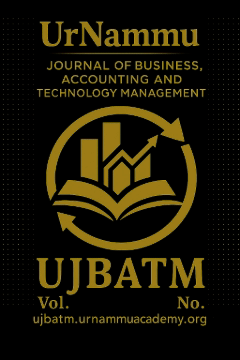Aims and Scope
The UrNammu Journal of Business, Accounting and Technology Management (UJBATM) acknowledges the evolving landscape in which contemporary organizations, both public and private, must navigate. Recognizing the increasing integration of business strategies, accounting practices, and technological advancements, the journal seeks to provide a scholarly platform dedicated to exploring how these interlinked areas can enhance organizational effectiveness and competitive advantage.
The UJBATM offers a robust mix of carefully curated themed issues, empirically sound research articles, timely theoretical insights, and practical overviews that can be directly implemented in professional settings. The journal particularly emphasizes interdisciplinary studies that bridge gaps between business management, accounting standards, and technology-driven innovation, thereby ensuring comprehensive and up-to-date coverage of emerging trends and practices within these essential fields.
The UJBATM covers submissions on the following topics, but not limited to:
1. Business and Management:
Strategic Management, Human Resource Management, Operations Management, Organizational Behavior, Marketing Management, Financial Management, International Business, Entrepreneurship, Leadership Studies, Supply Chain and Logistics, Innovation and Change Management, Public and Nonprofit Management, Corporate Strategy, Talent Management, Performance Management, Industrial and Labor Relations, Customer Relationship Management (CRM), Behavioral Strategy, Cross-Cultural Management, Sustainability and Green Management, Conflict Management, Total Quality Management (TQM), Risk Management, Corporate Social Responsibility (CSR).
2. Accounting and Auditing
Financial Accounting, Managerial Accounting, Auditing, Taxation, Forensic Accounting, Governmental and Nonprofit Accounting, International Accounting, Accounting Information Systems, Sustainability Accounting, Cost Accounting, Financial Reporting and Analysis, Budgeting and Forecasting, Internal Auditing, External/Statutory Auditing, Transfer Pricing, Corporate Tax Planning, Fraud Examination, Ethics in Accounting, Integrated Reporting (IR), Public Sector Auditing, International Financial Reporting Standards (IFRS).
3. Technology Management
Information Systems Strategy, Business Intelligence and Analytics, IT Project Management, Enterprise Systems (e.g., ERP, CRM), Cybersecurity Management, E-Business and E-Commerce, Data Management and Governance, Health Information Systems, Artificial Intelligence in Business, Digital Transformation, Decision Support Systems, Human-Computer Interaction, Cloud Computing in Business, Blockchain for Business Processes, Knowledge Management Systems, Systems Analysis and Design, IT Governance and Compliance, Mobile and Web-Based Applications, Internet of Things (IoT) for Business.








